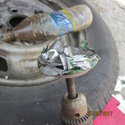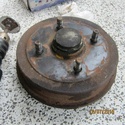Originally Posted By: davison0976
Originally Posted By: newtoncd8
Originally Posted By: davison0976
I highly doubt normal street driving generates enough heat to actually warp the rotors. Areas of excessive brake pad deposits, however, is something I have seen over and over again when replacing rotors on cars with an auto. Therefore, it must be a question of finding quality brake pads that can withstand being pressed against hot rotors without leaving isolated spotting.
Interesting post ... our RX330 has had a rotor pulsation issue occur about every 25-35k since new. I have tried OEM Lexus, Advics, Akebono and even tried cryogenic rotors -- and the pulsation always comes back. I always ensure the lug nuts are hand torqued and I lube the pins.
Based upon my research and a recommendation from topbrakes, for this brake replacement, I went with Porterfield R4-S carbon fiber brake pads. So far, I only have about 3,000 miles on them, so I don't know if the same deposit issue will reoccur, but it can't be any worse than previous sets of pads. I will report back when/if it reoccurs.
Perhaps this might help others that experience the issue.
One theory I am currently trying to prove/disprove is that the root cause of all of this is a partially sticking brake caliper piston that doesn't fully release. It keeps pressing brake pads against the rotor a little harder than it should while driving with no brakes applied causing surface temperatures to stay hotter on average. Then when brakes are applied more heat is released and brake pad material gets deposited in patches like on the pics I had posted.
Last time I did the brake job I lubricated inside the rubber boot covering brake caliper piston with brakes silicone lube before pressing the pistons in. It has only been a few thousand miles so far. Will see how it goes.
If your calipers have retraction springs (mine do but I THINK they aren't universal) it might be worth getting new ones, and maybe replacing the other ancilliary hardware (I have stainless steel clips that the pad ears move on).
Stiction can also occur between the calipers and pins, which should be clean and lubricated. I cleaned mine with aluminium foil, lubricated with silicon grease, and wrapped PTFE tape around them. The last isn't a generally recommended procedure and might be a bad thing if the brakes ever get really hot, so I might not do it again.
Apologies if this is all obvious.







